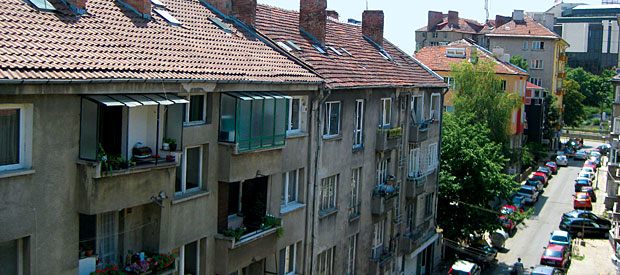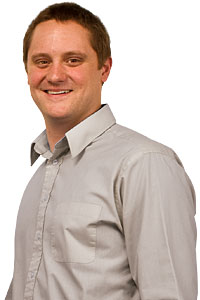Passport to the Balkans
When three law students spent their summer internships in Sofia, Bulgaria, they encountered a country in transition seeking new paths of progress.
When three law students spent their summer internships in Sofia, Bulgaria, they encountered a country in transition seeking new paths to progress.

A Problematic Refugee System 
Bradley King
Meet Ajmal, a teenager from a war-torn Afghan village who sought security and the promise of a good education in Europe. He walked and hitchhiked thousands of miles to the outer borders of the European Union to achieve that dream. Once there, a border guard put him in detention, where he stayed for the remainder of his teenage years. His refugee status application was repeatedly ignored or simply thrown away, only to be rejected when it was finally filed properly.
Meet Irfan, a middle-aged Pakistani national who lived for years—with valid documentation—in Europe, running a small, legitimate family business with his European wife. One day, government authorities labeled him a national security threat and placed him in detention. He was separated from his wife for three years, each day fearing deportation back to the dangerous home he fled in the first place.
These are but two (identity-protected) examples of a typical asylum-seeker’s life in Bulgaria. With minimal government transparency, a new and increasingly tenuous EU membership, and a location on the Middle-Eastern border of Europe, Bulgaria is home to an important yet problematic refugee system. Bulgarian headlines of organized crime and government corruption unfortunately result in this tumultuous nation paying little mind to the state of its refugee law.
Once inside a Bulgarian detention center, civil rights seem an antiquated notion. Unsanitary conditions are rampant, and many regulations that apply to criminal prisons are absent. This is why, for example, one “guest” was kept in solitary confinement for several months, when prison regulations dictate a maximum of two weeks.
"With minimal government transparency, a new and increasingly tenuous EU membership, and a location on the Middle-Eastern border of Europe, Bulgaria is home to an important yet problematic refugee system."
My 2008 summer internship was at the Legal Clinic for Refugees and Immigrants, located in Sofia, Bulgaria’s capital. This nonprofit legal team assists asylum-seekers by petitioning the Bulgarian courts for various remedies, such as release from detention. One of my assignments was to draft a client application to the European Court of Human Rights, a common means of last resort when all domestic avenues have been exhausted. Another was to create a briefing document on the state of refugee law in Bulgaria. The latter proved especially difficult, with refugee data commonly unverified, unavailable, and outdated.
My 10 weeks at the clinic included a vast array of legal challenges for our often desperate clients, and, thankfully, some rays of hope: both Ajmal and Irfan were released from detention as a result of the clinic’s efforts. In turn, to paint a grim picture of Bulgaria would be decidedly unfair and inaccurate. The friends I made through work were immensely hospitable and eager to share the nation’s rich heritage and natural splendor, be it a traditional meal, the sound of Bulgarian folk music, or an arduous trek into rugged mountains containing crystal clear lakes. Unlike many European nations, Bulgaria’s past speaks of a land of cultural diversity and historical racial tolerance. I hope to return one day, and when I do, I hope to encounter new paths to progress.
Corruption in the Judiciary
by Jesse Clark

Jesse Clark
I was literally catapulted from my bed the morning of July 3, 2008. My wakeup call was a series of explosions so powerful that my apartment building was swaying and nearby windows had shattered. Out of my bedroom window I could see a mushroom cloud rocketing skyward. I had been living in Bulgaria long enough to realize that anything was possible and was relieved when the authorities announced that there had not been a nuclear explosion.
A fire at a munitions storage facility caused 1,500 tons of Soviet-era munitions to detonate that morning. When I arrived at work my Bulgarian colleagues were going about their jobs like every other day. When I mentioned the massive cloud still visible out of our office windows, they dismissed it saying that a politician probably planned “the fire” in order to steal the money that had been earmarked to properly disarm the munitions.
I chose to spend the summer between my first and second years of law school working at Gruikin, Tanchovski, and Velichkov, a small Bulgarian law firm in the heart of Sofia. My daily work at the firm was split between drafting documents for the firm's European and American business clients and drafting documents for NGOs working in Bulgaria. The NGOs help the severely impoverished Roma (Gypsy) population. Often my work included writing memos, informing our clients that their land, business, or investment interest had been fraudulently taken from them. The Bulgarian government often “loses documents” and “requires more documents” to stop the NGOs from helping the Romas.
"There have been more than 150 contract killings of Bulgarian politicians and businessmen in the last seven years. Out of the 150 killings there has not been a single arrest, let alone a conviction."
Bulgaria is a former Eastern Bloc country still struggling to be a democracy run by the rule of law. When the Soviet Union disintegrated in 1991, the mafia stepped in to run Bulgarian government and businesses. The mafia has no plans to give up their control without a fight. There have been more than 150 contract killings of Bulgarian politicians and businessmen in the last seven years. Out of the 150 killings there has not been a single arrest, let alone a conviction. Recent headlines in Bulgaria read: “Mob Muscles Its Way into Politics in Bulgaria,” “Inside Europe’s Corruption Capital: How Bulgaria’s Crime Mafia Plunders EU Grant Money,” and “Mafia Still Has the Word in Bulgaria.” The Bulgarian judiciary is fraught with corruption from the highest judicial body in the country to solo-practicing attorneys and small-town judges.
Although it is easy to dwell on the corruption in Bulgaria, there is much to be said for the country’s culture, natural beauty, and future. I made friends in Bulgaria that I expect to last a lifetime and I look forward to many return trips. My Bulgarian friends were proud to take me on road trips to show off their country, so that I could see such things as the beautiful Rila Mountains and Black Sea coast. I worked at a young firm, run by three young partners who strongly believe in a Bulgaria free from corruption. What I look forward to most are headlines that will read: “Bulgaria, a Beacon of Hope for Countries Struggling with Corruption” and “Bulgarian Judiciary Has No Mercy on the Mafia.”
Judicial Systems and Legal Philosophy
by Brad Alexander
 Brad Alexander
Brad Alexander
On my first day of work, my boss introduced me to his friend, a judge, who asked why I was interested in Bulgaria. I replied that I liked the culture, history, and people of Eastern Europe, and wanted to travel there more. “You are not in Eastern Europe, ” the judge responded. “You are in the Balkans.” Though I was geographically correct, the Balkans are clearly a place of their own.
I arrived in Bulgaria just in time for the annual meeting of the Rule of Law Institute. I was the fourth and final speaker, and I had exactly one week to prepare. I spent five hectic days of researching and meeting government officials, lawyers, and businesspeople. But each day began with a slow cup of coffee and chat with another lawyer, Vili, who before 1989 (the fall of communism) was a lawyer for a big insurance defense firm.
I learned enough about the Bulgarian judicial system to put together an hour-long presentation comparing it to that of the United States. As a new member of the European Union, the Bulgarian government is undergoing much change—making an effort to Westernize many of its practices and bring them in line with EU requirements. My presentation analyzed treatment of two general areas: discrimination and human rights violations.
A largely conservative country, Bulgaria has resisted Western European approaches to controversial issues like the disbursement of birth control pills and sexual orientation discrimination in employment. In fact, I witnessed the first march for gay equality in Bulgarian history, which was met with resistance, protests, and even violence.
"I had been in the country only a week, and had been in law school only a year, but at that meeting I was able to discuss judicial systems and legal philosophy with lawyers, judges, leaders of industry, and members of the government."
In the area of human rights, I focused on trafficking, a relatively new area in U.S. law and a particularly relevant one in Bulgaria, where geography makes the country especially vulnerable. Bulgaria’s laws focus significantly on preventative, national education about the problems and dangers of trafficking, an approach that has many advantages. I was later able to use this research at the Legal Clinic for Refugees, both in my own case research and in presenting the head of the clinic with options for clients.
Another critical need is increased transparency in government decision making. Corruption persists in the country due to insufficient oversight by government officials. Just this past year Bulgaria had to return millions of Euros given by the EU to assist in development because public officials had improperly used the money. This marked the first time any EU aid money had to be returned.
What I remember most from the meeting was not the (translated) speech I gave, but the discussion that ensued. I had been in the country only a week, and had been in law school only a year, but at that meeting I was able to discuss judicial systems and legal philosophy with lawyers, judges, leaders of industry, and members of the government. It was evident that while the country has made great strides, it still has far to go. Those in the room believed that the rule of law is an essential principle on which government changes should always be focused.
King, Clark, and Alexander completed their internships with support from the International Human Rights Program of the Herbert and Elinor Nootbaar Institute on Law, Religion, and Ethics. To learn more about this program, visit law.pepperdine.edu/nootbaar/.
